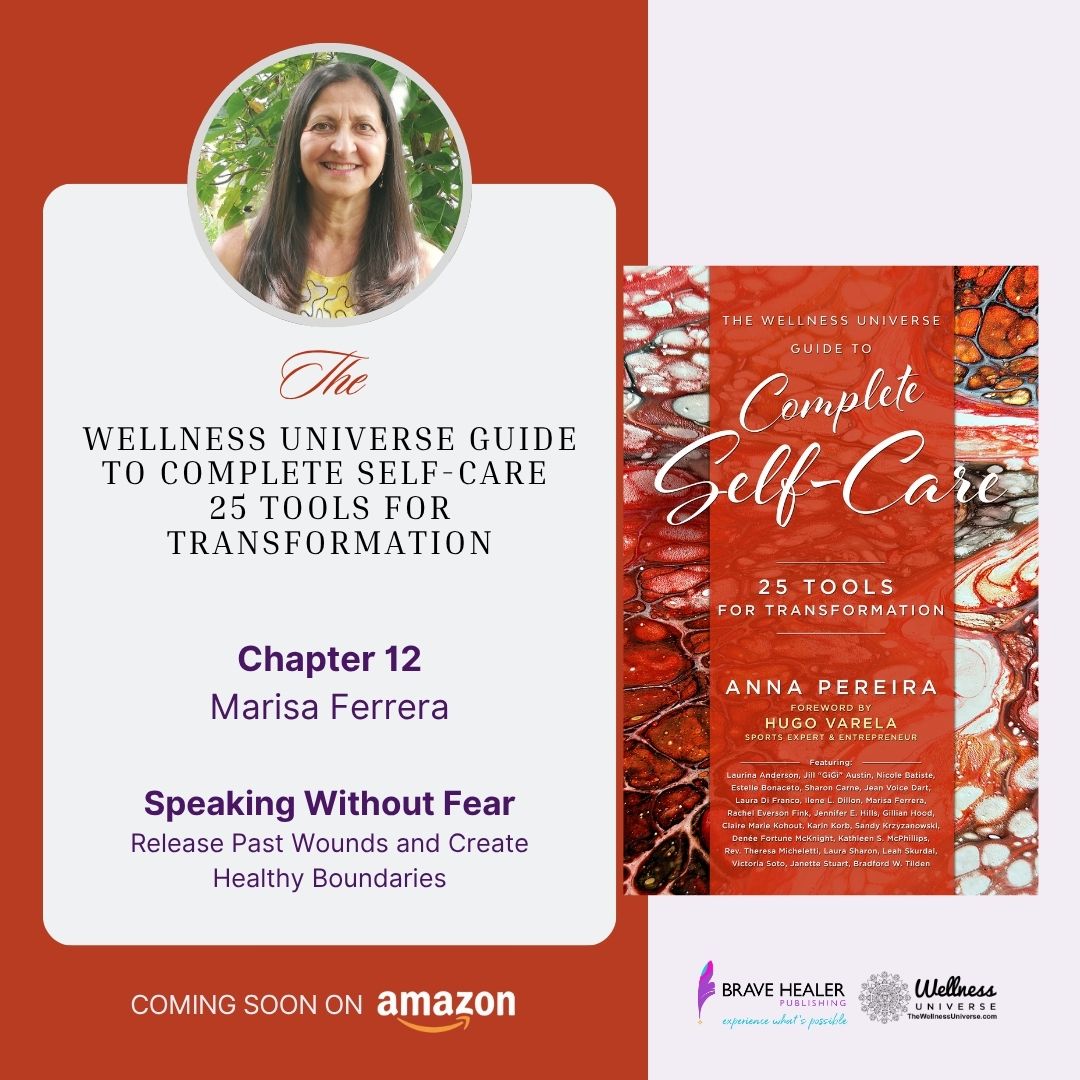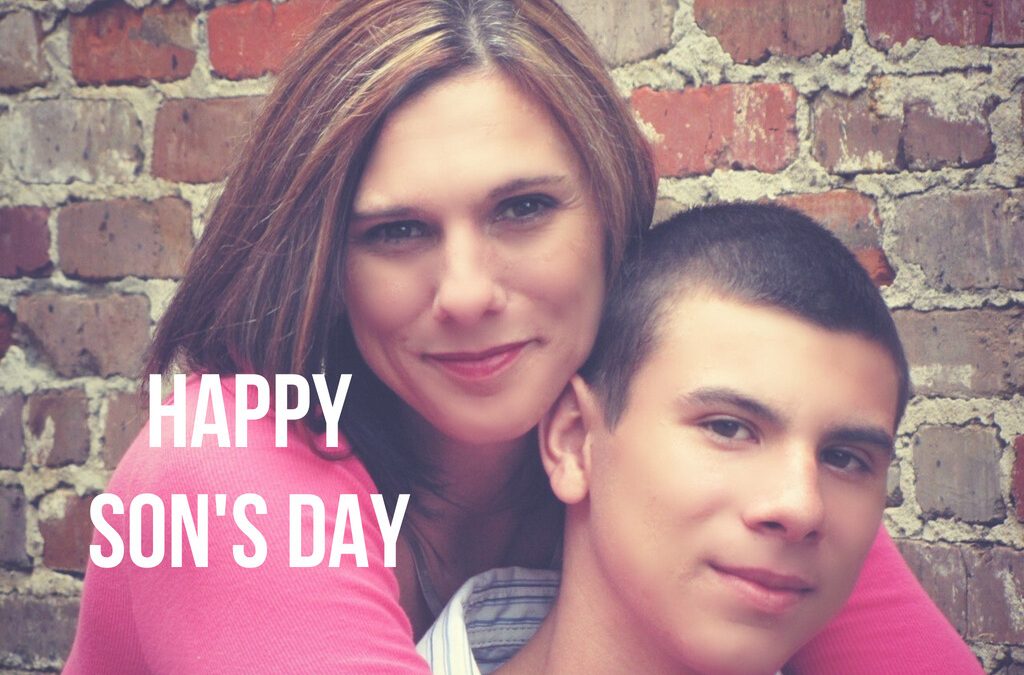
by Marisa Ferrera | Jun 11, 2025 | Relationships, Special Days
Father’s Day can be a joyful celebration—or a painful reminder.
For many women, their relationship with their father is one of the most powerful influences in their lives. When that bond is loving and secure, it often lays the foundation for confidence, self-worth, and the ability to form healthy, trusting relationships. But when the relationship is strained, distant, or painful, it can leave deep emotional wounds that show up in subtle—and not so subtle—ways throughout life.
I know this from personal experience.
For years, I carried the pain of unresolved conflict with my father. I longed for his approval, feared his judgment, and struggled to express my truth without fear. That inner turmoil spilled into other relationships—making it harder for me to set boundaries, trust myself, or fully step into my power.
But that’s not the end of my story.
Through deep personal healing, I found the courage to face those wounds and have a conversation with my father that changed everything. It wasn’t easy—but it was one of the most liberating moments of my life. I finally spoke without fear, without blame, and with an open heart. That one moment marked the beginning of a profound transformation in our relationship—and in me.
 I share this story in the upcoming book, The Wellness Universe Guide to Complete Self-Care: 25 Tools for Transformation, where I contribute a chapter titled “Speaking Without Fear: Release Past Wounds and Create Healthy Boundaries.” My chapter offers both my personal story and a practical tool you can use to heal past wounds—especially those involving family.
I share this story in the upcoming book, The Wellness Universe Guide to Complete Self-Care: 25 Tools for Transformation, where I contribute a chapter titled “Speaking Without Fear: Release Past Wounds and Create Healthy Boundaries.” My chapter offers both my personal story and a practical tool you can use to heal past wounds—especially those involving family.
Join The Book Launch Team
If my story resonates with you and you’d like to support this powerful book and message, I’d love for you to join the 25 Tools for Transformation book launch team.
As a launch team member, here’s what’s required:
- Read the advanced PDF reader copy of the book before anyone else! (You’ll receive a free copy before the launch.)
- Purchase the eBook on launch day—it’s specially priced at just $1.99!
- Leave your honest review on Amazon to help spread the word and support this mission.
If you’d like to support this launch and discover the power of self-care while enjoying the chance to win your share of over $20,000 in fantastic prizes, join before June 24 so you don’t miss the email with your early copy of the book.
This Father’s Day, I invite you to reflect on your relationship with your father. Whether it’s filled with love or marked by pain, know that healing is possible—and your voice matters.

by Marisa Ferrera | Feb 13, 2025 | Relationships, Special Days
Valentine’s Day tends to focus on romantic love, but at its core, it’s about all forms of love—including the deep connections we share with family. What if we carried the spirit of Valentine’s Day into every single day? By nurturing our relationships, practicing open communication, and creating healthy, loving boundaries, we can create a family environment filled with warmth and understanding long after February 14th has passed.
Tips to Help you Strengthen your Family Connections
1. Show Love in the Little Things
Love isn’t just about saying “I love you”—it’s about everyday gestures that show you care. Acknowledge your family’s efforts, express gratitude, and offer words of encouragement. Small things, like a warm hug, a thoughtful note, or simply putting your phone down and listening, can make a huge difference in strengthening your bond. Love is also about consistency—showing up for people when they need you, celebrating their wins, and being a source of support in tough times. Sometimes, it’s as simple as checking in with a quick text or making their favorite meal just because.
2. Make Time for Each Other
Life gets busy, and it’s easy to take family relationships for granted. Make a conscious effort to carve out quality time—whether it’s a weekly dinner, a shared activity, or just a walk together. What matters most isn’t the activity itself, but being fully present in the moment. If you live far from family, schedule regular phone or video calls to stay connected. It’s not about grand gestures; rather, it’s the little things that build meaningful relationships over time. Even a five-minute check-in or a handwritten letter can make someone feel cherished.
3. Practice Compassion and Forgiveness
No family is perfect, and disagreements are inevitable. Instead of holding onto resentment, see conflict as an opportunity to grow and heal. When tensions arise, listen with an open heart, express your feelings calmly, and focus on understanding rather than winning. Put yourself in the other person’s shoes—everyone has their struggles, and sometimes a little patience can go a long way. A genuine apology can mend wounds, and choosing to let go of minor grievances can create a more peaceful family dynamic. Compassion means choosing love over ego and prioritizing harmony over being right.
4. Create Healthy Boundaries
Strong relationships thrive on mutual respect and clear boundaries. Boundaries aren’t about shutting people out—they’re about ensuring love and respect flow freely without resentment. Communicate your needs honestly and kindly, and respect the limits of others as well. For example, if you need space after a long day, express that with kindness rather than frustration. If a family member tends to overstep, set gentle yet firm boundaries that honor your emotional well-being. Boundaries create clarity, reduce misunderstandings, and foster deeper connections based on mutual respect.
5. Celebrate the Everyday Moments
You don’t need a special occasion to celebrate the people you love. Acknowledge milestones, both big and small, and take time to appreciate each other. A kind word, an unexpected note, or a shared laugh can make family members feel seen and valued. Make it a habit to notice the good in your family members and verbalize it—tell them when they’ve done something well, thank them for their kindness, and remind them of their strengths. Gratitude fosters closeness, and when family members feel appreciated, they’re more likely to show love in return.
6. Lead with Love
Creating a loving family atmosphere starts with you. When you choose patience, kindness, and empathy, you set the tone for those around you. Your energy influences the way your family interacts, encouraging warmth and understanding in every interaction. Lead by example—if you want more love in your family, be the first to give it. Offer encouragement, be an active listener, and express your love freely. The way you show up in your relationships will inspire others to do the same.
7. Incorporate Acts of Service
One of the most profound ways to show love is through acts of service. Doing something thoughtful for a family member—whether it’s helping with chores, running an errand, or simply making them a cup of tea—demonstrates care in a tangible way. It’s often the unspoken actions that speak the loudest. Pay attention to what your loved ones need and find small ways to ease their burdens. Love isn’t just in words; it’s in the everyday actions that make life a little easier for those around us.
8. Keep Communication Open and Honest
Honest and open communication is the foundation of any strong relationship. Don’t be afraid to express your feelings, and encourage your family members to do the same. Create a safe space where everyone feels heard and respected. If there’s tension, address it with kindness instead of avoidance. Clear, heartfelt communication prevents misunderstandings and deepens trust, allowing love to flourish naturally.
9. Create Meaningful Traditions
Traditions bring families together and create lasting memories. Whether it’s a Sunday breakfast, an annual family trip, or a game night, traditions give family members something to look forward to and strengthen their bond. You don’t need anything elaborate—simple rituals, like writing letters to each other on special occasions or watching a favorite movie together, can become cherished family traditions that deepen connection over time.
10. Extend Love Beyond Your Immediate Family
Love isn’t limited to immediate family—extend it to relatives, close friends, and even neighbours. Small acts of kindness, like checking in on an elderly family member or supporting a friend in need, create ripples of love that enrich all your relationships. The more love you give, the more you create an environment where love thrives naturally.
This Valentine’s Day, let’s go beyond flowers and chocolates. Let’s commit to making love a daily practice in all our relationships, creating strong and lasting connections that bring joy, kindness, and appreciation—every single day of the year. Love is not a once-a-year event; it’s a way of living that enriches both you and those around you.
If you’d like personalized support in navigating family dynamics, creating healthy boundaries, and/or improving communication, I’d love to help. Schedule a complimentary call with me, and let’s create a plan to bring more love and peace into your family relationships.
Schedule Your Complimentary Call Here

by Marisa Ferrera | Jan 1, 2025 | Relationships, Special Days
As the New Year approaches, there’s a certain magic in the air. It’s a time of reflection, hope, and renewal—a perfect opportunity to set meaningful intentions that align with your heart’s deepest desires. For many women, the start of a new year brings the hope of mending broken connections, healing old wounds, and creating healthier, more fulfilling relationships with family members.
If you’ve been struggling with a dysfunctional family relationship, you’re not alone. Family dynamics can be one of the most challenging areas of life to navigate. Yet, they also hold incredible potential for growth, healing, and transformation. As you step into 2025, consider setting an intention to heal from the pain of the past and create healthier dynamics with the people who matter most to you.
Here are five empowering steps to guide you on this journey:
1. Reflect on Your Relationship Patterns
Healing begins with awareness. Take some time to journal about the family relationships that feel difficult or painful. What patterns do you notice? Are there recurring conflicts, unspoken resentments, or unhealthy boundaries?
Be compassionate with yourself as you explore these dynamics. Remember, awareness is not about assigning blame but understanding where things stand so you can move forward with clarity.
2. Set a Clear and Compassionate Intention
Intentions are powerful because they focus your energy and attention. Instead of making a resolution like, “I will fix my relationship with my mother,” try setting a more open and compassionate intention, such as, “I will work on creating healthier boundaries and fostering mutual understanding in my family relationships.”
This subtle shift allows space for growth and healing without placing pressure on achieving a specific outcome.
3. Learn and Practice Healthy Boundaries
Boundaries are the foundation of any healthy relationship. They protect your well-being and communicate your needs clearly and respectfully. If setting boundaries feels challenging, start small. Practice saying “no” to things that don’t serve you, and express your feelings in ways that honor both yourself and the other person.
Remember, boundaries are not about controlling others; they’re about taking responsibility for your own emotional health.
4. Transform Conflict into Opportunities for Growth
Conflict doesn’t have to be destructive. When approached with intention, it can become a doorway to deeper understanding and connection. Instead of avoiding difficult conversations, learn to navigate them with empathy and curiosity.
The next time a disagreement arises, pause and ask yourself, “What is this conflict teaching me about myself and this relationship?” This mindset shift can open new possibilities for healing.
5. Seek Support and Resources
You don’t have to go through this journey alone. Whether it’s through a trusted friend, therapist, coach, or support group, having a safe space to share your experiences can make all the difference. There are also many books, workshops, and online resources available to help you build the skills needed to heal and grow.
Here are a couple of FREE resources to get you started:
Create Healthy Boundaries Guide
Resolve Conflicts Peacefully Guide
A Heartfelt Invitation for 2025
As you set your intentions for the year ahead, remember that healing is a journey, not a destination. Be gentle with yourself and celebrate every small step forward. Even the act of setting this intention is a powerful declaration of your commitment to growth and self-love.
Imagine what your life could look like at the end of 2025: healthier boundaries, deeper connections, and the freedom to show up authentically in your family relationships. This vision is within reach, and it all begins with the intention you set today.
Here’s to a year of healing, growth, and transformation. May 2025 be the year you reclaim your power, nurture your heart, and create the loving, supportive family dynamics you deserve.
If you’re committed to healing your dysfunctional family relationships this year, I invite you to schedule a complimentary relationship renewal discovery session with me. Let’s explore together whether or not we’re a good fit for working together.

by Marisa Ferrera | Oct 11, 2024 | Relationships, Special Days
Thanksgiving is a time meant for gathering, gratitude, and joy, but it can also be stressful when family members are not getting along. You might have some relatives who refuse to come together, and that can cast a shadow on your holiday plans. It’s a reality many people face, but there are ways to prepare yourself mentally and emotionally to create a peaceful and happy day despite the challenges.
1. Let Go of Expectations
One of the biggest sources of stress is the expectation that Thanksgiving should look a certain way: everyone gathered around the table, smiling, and getting along perfectly. However, that’s not always realistic. Accepting that your holiday might not fit this ideal can free you from disappointment. Focus instead on creating meaningful moments with the people who are present and making the best of your time with them.
2. Acknowledge Your Feelings
If you feel sadness, frustration, or disappointment about the family members who aren’t attending, allow yourself to feel that. It’s normal to grieve the loss of an ideal family gathering. Once you acknowledge those feelings, you can release them instead of letting them linger and affect the rest of your day. This emotional release can create space for gratitude and joy.
3. Set Boundaries Early
Family dynamics can be complicated, especially during the holidays. It’s important to know your limits and be clear about them. If a particular conversation topic or behavior triggers conflict, kindly but firmly communicate those boundaries ahead of time. Let family members know what’s off-limits for discussion and what you need to feel comfortable with. It may feel uncomfortable at first, but it helps avoid unnecessary tension.
4. Consider Smaller Gatherings
If a large family gathering is unrealistic or could cause too much strain, consider hosting smaller, separate events. You could celebrate with one side of the family on Thanksgiving and another the day after, or host a smaller dinner with close relatives or friends. This can help everyone enjoy the holiday without the pressure of bringing together conflicting personalities.
5. Focus on Gratitude
Thanksgiving is all about gratitude, and you can still cultivate that, even in difficult circumstances. Shift your focus from what’s missing to what you have. Perhaps a few family members won’t be there, but who will be there? What moments or traditions can you still enjoy? By emphasizing gratitude, you can shift the energy of the day and feel more at peace.
6. Manage Your Own Emotions
It’s easy to let other people’s behaviors dictate how you feel, but remember: you are in control of your own emotional experience. If family members choose not to attend or if there’s unresolved tension, that doesn’t mean your holiday has to be ruined. Practice grounding techniques such as deep breathing, mindfulness, or journaling to stay centered, calm, and in control of your reactions.
7. Create New Traditions
If family members aren’t attending due to conflict, consider starting new traditions that reflect the current situation. You might plan a fun activity with the family or friends who are present, such as a gratitude walk, a board game night, or a group reflection on what you’re thankful for. Embracing new traditions can reduce the focus on what’s missing and add joy to the day.
8. Seek Support if Needed
If family tensions are particularly high, it’s okay to seek support. Reach out to a friend or a coach to talk through your feelings. Sometimes, an outside perspective can help you see things differently and provide tools to navigate the situation. Don’t hesitate to prioritize your own well-being, even if it means leaning on someone else for support.
9. Embrace Imperfection
At the end of the day, no family is perfect, and no holiday has to be either. The most important thing is that you approach the day with an open heart and the intention to create peace and joy, even if things don’t go as planned. The holidays are an opportunity for growth, reflection, and healing—even when they look different than expected.
Navigating family conflict during the holidays can be tough, but with some preparation, boundaries, and a focus on gratitude, you can create a Thanksgiving that’s meaningful and happy. Remember, it’s not about the perfect family gathering—it’s about appreciating what you have and making the best of the moment.

by Marisa Ferrera | Sep 28, 2024 | Relationships, Special Days
As we celebrate National Son’s Day, it’s a perfect time to reflect on the unique bond between mothers and their sons. This day serves as a reminder of the love, pride, and sometimes the challenges that come with raising a son. For many mothers, the transition of their son from childhood to adulthood can bring about a shift in their relationship that’s both exciting and challenging. If you find yourself struggling to maintain a close connection with your adult son while staying true to yourself, this is an opportunity to explore how you can foster a healthier, more fulfilling relationship.
Here’s how you can begin to create a healthier relationship with your adult son while staying true to yourself.
1. Acknowledge the Shift in Dynamics
The first step toward healing is recognizing that your relationship has changed. Your son is no longer the little boy who relied on you for everything; he’s a grown man with his own thoughts, feelings, and life choices. Acknowledging this shift can help you adjust your expectations and approach your relationship with the respect and understanding that adulthood requires.
2. Embrace Open and Honest Communication
Healthy communication is the cornerstone of any relationship, especially between a mother and her adult son. It’s essential to express your thoughts and feelings openly while also being compassionate. Avoid making assumptions about how your son feels; instead, ask him directly. Encourage a two-way dialogue where both of you feel heard and valued. Remember, it’s okay to set aside pride and be vulnerable—this can lead to deeper understanding and connection.
3. Create and Respect Boundaries
As much as you want to be there for your son, it’s crucial to establish healthy boundaries that protect both of you. Boundaries are not about shutting each other out; they’re about creating a space where both parties can thrive. Discuss what boundaries are important for each of you, whether it’s about the frequency of visits, topics of conversation, or involvement in each other’s lives. Respecting these boundaries shows that you value each other’s independence and personal space.
4. Let Go of Control
One of the hardest things for a mother is letting go of the desire to control or influence her son’s choices. But as difficult as it may be, letting go is vital to fostering a healthy relationship. Trust that you’ve raised a capable individual who can navigate life’s challenges. Offer guidance when asked, but avoid imposing your views or solutions. By stepping back, you give your son the room to grow, learn, and come to you on his own terms.
5. Use Conflict as an Opportunity for Growth
Conflict is inevitable in any close relationship, but it doesn’t have to be destructive. Instead of avoiding or fearing conflict, view it as an opportunity to address underlying issues and strengthen your relationship. Approach disagreements with a mindset of healing rather than winning. Ask yourself what the conflict is really about—often, it’s not just about the surface issue but deeper feelings of fear, disappointment, or unmet expectations. Use these moments to heal old wounds and create new understanding between you and your son.
6. Prioritize Self-Care and Personal Growth
While nurturing your relationship with your son, it’s equally important to nurture yourself. Make time for activities that bring you joy, relaxation, and fulfillment. Engage in personal growth practices, such as journaling, meditation, or seeking support from a coach or therapist. By taking care of yourself, you’ll have the emotional strength and clarity to show up as your best self in your relationship with your son.
7. Celebrate His Independence
Finally, celebrate your son’s journey into adulthood. Appreciate the person he has become and the unique path he is carving out for himself. Let him know that you are proud of his achievements and support his decisions. By celebrating his independence, you reinforce your trust in him and your belief in his ability to lead a fulfilling life.
Final Thoughts
Creating a healthier relationship with your adult son doesn’t mean losing yourself in the process. It’s about finding a balance where both of you can flourish—individually and together. By embracing these principles, you can foster a bond that is not only strong but also enriching and deeply fulfilling for both you and your son. Remember, it’s never too late to heal, grow, and build a relationship that honors the love you have for each other while staying true to who you are.
If you’re experiencing a challenging relationships with your son, I invite you to schedule a complimentary Relationship Renewal Discovery Session.
Get the clarity and direction you need to transform conflict into deeper connections and experience more peace, love, and joy.

by Marisa Ferrera | Jun 13, 2024 | Relationships, Special Days
Transforming Conflict into Connection: A Father’s Day Guide
Father’s Day is a time to celebrate the unique bond between fathers and their children. However, for many, past conflicts and unresolved issues can complicate this relationship. Instead of letting these conflicts create distance, you can use them as opportunities to build a deeper, more meaningful connection with your father. Here’s a step-by-step guide to turning conflicts into deeper connections this Father’s Day.
Step 1: Reflect on the Conflict
Before addressing any conflict, it’s important to take some time to reflect on it. Ask yourself:
- What was the conflict about?
- How did you feel during the conflict?
- How do you feel now when you think about the past unresolved conflict?
- What needs were not met for you during this conflict?
- What do you believe was your father’s perspective?
- How do you guess your father felt during the conflict?
- How do you guess your father feels now about the past unresolved conflict?
- What needs, would you guess, weren’t met for your father during the conflict?
Understanding your own feelings and unmet needs and guessing the feelings and unmet needs of your father will prepare you for a more constructive conversation.
Step 2: Acknowledge Your Feelings
Once you have reflected on the conflict, acknowledge your feelings. It’s okay to feel hurt, angry, or disappointed. Recognizing and honouring your emotions is a crucial step towards healing. Remember that these feelings are valid and an essential part of your experience.
Step 3: Choose the Right Time and Place
Timing is key when it comes to discussing sensitive issues. Choose a time when both you and your father are likely to be calm and free from distractions. A quiet, comfortable setting can help create a conducive environment for an open and honest conversation.
Step 4: Start with Empathy
Approach the conversation with empathy and understanding. Begin by expressing your appreciation for your father and acknowledging his positive qualities. This sets a positive tone and shows that you value the relationship.
For example, you could start by saying, “Dad, I really appreciate everything you’ve done for me. I know you care about our relationship as much as I do.” What’s important is that you share authentic feelings about something positive to create a heart-to-heart connection.
Step 5: Use “I” Statements
When discussing the conflict, use “I” statements to express your feelings without sounding accusatory. This helps in avoiding a defensive reaction and keeps the focus on your perspective.
For example, instead of saying, “You never listen to me,” try saying, “I felt angry when I expressed my thoughts to you and didn’t feel heard or understood.”
Step 6: Listen Actively
Active listening is crucial in any meaningful conversation. Allow your father to share his perspective without interrupting. Show that you are listening by nodding, maintaining eye contact, and using affirming words like “I understand” or “I see” or “tell me more about that.”
Reflect on what you hear to ensure understanding. For example, “It sounds like you felt upset when I said _____. Is that right?”
Step 7: Seek Common Ground
Find common ground by acknowledging any valid points your father makes. This demonstrates that you value his perspective and are willing to work towards a peaceful resolution.
For example, “I understand why you felt that way, and I agree that we need to communicate better.”
Step 8: Apologize and Forgive
If appropriate, offer a genuine apology for your part in the conflict. This can pave the way for mutual forgiveness and healing.
For example, “I’m sorry for not considering your feelings. I hope we can move past this and build a stronger relationship.”
Also, be open to forgiving your father for any hurt he may have caused. Forgiveness is a powerful tool for letting go of resentment and moving forward.
Step 9: Create a Plan for Moving Forward
Work together to create a plan for preventing similar conflicts in the future. Discuss how you can improve communication and set boundaries that respect both your needs.
For example, “Let’s agree to talk things out calmly instead of raising our voices when we disagree.”
Step 10: Celebrate the Progress
Finally, celebrate the progress you’ve made in transforming conflict into connection. Acknowledge the effort both of you have put into improving your relationship. Use Father’s Day as an opportunity to reinforce your commitment to a healthier, more meaningful relationship.
For example, plan a special activity or share a heartfelt note expressing your gratitude for the renewed connection.
Conclusion
Turning conflict into connection is not always easy, but it is a deeply rewarding process that can strengthen your relationship with your father.
By approaching conflicts with empathy, active listening, and a genuine desire to understand each other, you can transform challenges into opportunities for growth and deeper connection. This Father’s Day, take the first step towards healing and celebrate the bond you share with your dad.
Here’s a free gift that can further support you in resolving conflicts peacefully.

If you find yourself stuck resolving past issues and conflicts with your father, I invite you to schedule a complimentary call with me. We can take a closer look at what might be in your way and decide together whether or not I’m the best person to help you.

 I share this story in the upcoming book, The Wellness Universe Guide to Complete Self-Care: 25 Tools for Transformation, where I contribute a chapter titled “Speaking Without Fear: Release Past Wounds and Create Healthy Boundaries.” My chapter offers both my personal story and a practical tool you can use to heal past wounds—especially those involving family.
I share this story in the upcoming book, The Wellness Universe Guide to Complete Self-Care: 25 Tools for Transformation, where I contribute a chapter titled “Speaking Without Fear: Release Past Wounds and Create Healthy Boundaries.” My chapter offers both my personal story and a practical tool you can use to heal past wounds—especially those involving family.






